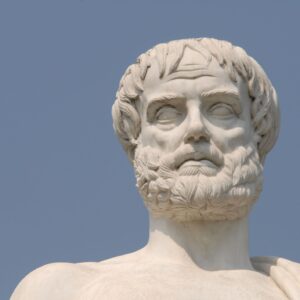Aristotle on Slavery
In the translation of Book One, Parts V-VII of Aristotle’s Politics, written in 350 BCE, Aristotle discussed slavery. He began by entertaining “natural slavery,” or the idea that certain people are born slaves. He believed natural-born slaves were physically adept but lacked rational thought. Thus, they should be ruled by a more rational master who could better understand their best-interests. If executed accordingly, Aristotle believed slavery would benefit both the master and his slave. However, his argument was ambiguous. While he acknowledged the existence of natural-born slaves, it remains unclear whether Aristotle advocated for slavery from a moral standpoint.
For one, Aristotle described slavery as both “expedient and right.” Politics was originally written in Ancient Greek, but modern English dictionaries define “expedient” as convenient and practical although possibly immoral. Thus, it is possible Aristotle understood the practicality of slavery yet did not believe it was morally acceptable. However, paired with the word “right,” it becomes more tempting to assume Aristotle believed slavery was morally just. Yet, this is not necessarily the case. “Right” could mean morally justified, but sometimes means factually accurate. Aristotle might have considered slavery as a sad fact of ancient life, meaning that some were inevitably slaves and others were masters, but still not believed it was not morally justified, or at least not always morally justified.
Aristotle also contemplated the idea that natural-born slaves only existed in nature’s most perfect state. He explained that “We must look for the intentions of nature in things which retain their nature, and not in things which are corrupted.” Since men aren’t perfect, nature always has had the possibility of being corrupted. He explained this more deeply through the concept of war. He acknowledged whoever had superior strength would win the war and enslave the loser. However, the winners may not have waged the war for a morally justified reason. Without moral justification, Aristotle suggested it was possible to enslave people who were not natural-born slaves.
Throughout his discussion of slavery, Aristotle never mentioned race as an attribute of natural-born slaves. This led me to question whether the slavery which he defended was different from the slavery we are familiar with in US history. There is more ambiguity in this excerpt than appears at first –something made even more obvious to me after reading the competing views of scholars Agnes Callard and Stephen Smith. Callard argues that slavery was so widely accepted no one would dare question it, but Smith argues that no one would question it because it would go against the social norms of the day, and whoever undermined it would be socially outcast. These assertions led me to question whether in this excerpt Aristotle offered a defense of slavery or was attempting to subtly undermine it without putting himself into social jeopardy.
Excerpt from Aristotle’s Politics, read by Jordyn Ney
Music By: Nick Rickert and Soothing Relaxation (Youtube)

